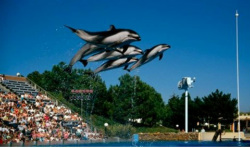 Charles and Carla Coonradt tell the story of an immense, 19,000-pound whale, Shama, that is taught in Sea World, Florida, to jump 22 feet out of the water and perform tricks. How do you suppose they teach the whale to do that? A typical parenting approach would be to mount a rope at 22 feet high out of the water, and encourage the whale to sail over it. “Jump, whale!” Maybe get a bucket of fish up there, reward the whale when it does the right thing. Set goals! Aim high! And you and I know the whale would stay right where it was. The Coonradts say, “So how do the trainers at Sea World do it? Their number-one priority is to reinforce the behavior that they want repeated—in this case, to get a whale or porpoise to go over the rope. They influence the environment every way they can so that it supports the principle of making sure that the whale can’t fail. They start with the rope below the surface of the water, in a position where the whale can’t help but do what’s expected of it. Every time the whale goes over the rope, it gets positive reinforcement. It gets fed fish, patted, played with, and most important, it gets that reinforcement. “But what happens when the whale goes under the rope? Nothing—no electric shock, no constructive criticism, no developmental feedback, and no warnings in the personnel file. Whales are taught that their negative behavior will not be acknowledged. Positive reinforcement is the cornerstone of that simple principle that produces such spectacular results. And as the whale begins to go over the rope more often than under, the trainers begin to raise the rope. It must be raised slowly enough so that the whale doesn’t starve, either physically or emotionally. “The simple lesson to be learned from the whale trainers is to over-celebrate. Make a big deal out of the good and little stuff that we want consistently. Secondly, under-criticize. Children know when they screw up. What they need is help. If we under-criticize, punish and discipline less than is expected, children will not forget the event and usually will not repeat it.” We need to make it difficult for children to fail, so there can be less criticism and more celebrations. Words for Loved Ones
0 Comments
Leave a Reply. |
Categories
All
Archives
March 2024
LinksFree Children's Stories |

 RSS Feed
RSS Feed
